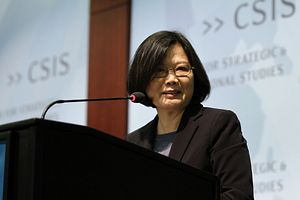The front-runner in Taiwan’s presidential race, Democratic Progressive Party (DPP) Chair Tsai Ing-wen, is visiting Japan this week on a “friendship tour.” Tsai arrived in Tokyo on October 6 to kick off a four-day visit during which she planned to meet with politicians, Taiwanese expatriates, and “friends” in Japan.
Polls have consistently shown Tsai leading by double-digits in Taiwan’s presidential race, making her a heavy favorite to win (such a favorite, in fact, that the rival Kuomintang is moving to replace its own candidate). Her trip to Japan sends an important signal about her foreign policy priorities should she win as expected in the January 2016 presidential election.
In a foreign policy speech on September 22, Tsai said that one of her priorities as Taiwan’s leader would be “strengthen our partnerships with the United States, Japan, and other like-minded democracies from around the world.” Tsai has emphasized the need for Taiwan to build up regional partnerships that will reduce its economic reliance on mainland China and carve out more international space for Taiwan.
“It is in our national interest to have strong and healthy relationships here by expanding our economic and cultural ties, and engage in dialogue on regional security and economic integration, such as joining the TPP,” Tsai said in her September speech.
Japan is a natural partner in this regard for both social and geopolitical reasons. A majority of Taiwanese have favorable opinions of Japan, and their regional interests are well aligned as well – both share a commitment to defending international law, democratic systems, and the U.S.-led alliance network in the Asia-Pacific. The two sides have already demonstrated their ability to cooperate even on contentious issues — in 2013, they signed a fishing agreement that would allow both sides to harvest fish from the waters off the Senkaku/Diaoyu islands, which are disputed by Japan and Taiwan (as well as mainland China).
Writing for The Diplomat, J. Michael Cole predicted even warmer Japan-Taiwan relations in the future: “Although Tokyo is unlikely to take actions that will cause serious harm to its important relationship with China, there is nevertheless a high likelihood that Japan will increase its cooperation with Taiwan and provide the necessary moral support to the DPP.”
Joseph Wu, the DPP’s secretary-general, told The Diplomat via email that Japan is “Taiwan’s most important as well as the best friend in the region.” He said that Tsai’s trip “will form a very good foundation for the bilateral relations in the next few years.”
“Taiwan needs to have a friendly international environment to develop its economy, and having friendly relations with Japan falls in this consideration,” Wu said.
On the economic front, Tsai has repeatedly indicated that she believes Taiwan should attempt to join the Trans-Pacific Partnership trade network, which just negotiated a final deal this week. Both Japan and the United States are part of the TPP, and Tsai asked Japanese Diet members to help Taiwan eventually join as well.
However, any attempt to expand Taiwan’s international role, including its bilateral relationship with Japan, will face steep opposition from Beijing. Chinese officials had already spoken out against Tsai’s visit to Japan before she even left Taiwan. In September, Chinese Foreign Ministry spokesperson Hong Lei said that Beijing was “extremely concerned about Tsai Ing-wen’s activities in Japan and resolutely opposed” to the visit. “We demand the Japanese side strictly abide by the one-China principle … and not provide space or any excuse for anybody to disseminate Taiwan independence,” Hong added.
Ma Xiaoguang, a spokesperson for the Taiwan Affairs Office, told reporters that China “firmly opposes any person in any way undertaking ‘Taiwan independence’ or splittist activities internationally, damaging and provoking cross-strait relations.” He did not specifically reference Tsai’s trip, but Ma was responding to a question about her visit to Japan.
Michael Fonte, the director of the DPP’s Washington, D.C. office, told The Diplomat that Tsai “is fully aware of the Chinese position.” As for the future of Taiwan-Japan relations under a likely Tsai presidency, Fonte suggested that China’s concerns would be taken into account. “Tsai Ing-wen’s commitment to maintaining the status quo in cross-strait relations is based on no provocative behavior by the DPP and striving to build a security dimension to the relationship with Japan would certainly be seen as provocative by China,” he said in an email to The Diplomat. Instead, Tsai would likely focus on other aspects of the relationship, particularly boosting trade.
Ironically, China’s sensitivity to Taiwan’s external relationships is partially driving Tsai’s visit to Japan this week. As Joseph Wu pointed out, should she be elected president, Tsai is unlikely to be able to visit Japan, as Beijing does not look kindly on Taiwanese officials traveling abroad. Because of that, “Tsai needs to use this opportunity to let the Japanese friends, either in the government or in the opposition, know her and know her policy and approach to Japan,” Wu said.
He added that the visit to Japan, along with Tsai’s visit this summer to the United States, was a way to demonstrate to the domestic Taiwanese audience that Tsai would be a “capable of handling foreign relations for Taiwan.”

































